Need for speed: meet Palestine's all-women racing team
A souped-up but dust-engrained rally car erupts and shoots forward, weaving deftly around the avenues of cones that lay across the track.
Drifting through the turns, the car leaves behind a cloud of dust and smoke as the engine roars louder.
The marshal waves the flag. The race has come to an end. Shouting to be heard over the din of roaring engines, the speaker announces the new time to beat: one minute and thirty-one seconds.
The driver steps out of the vehicle amid the loud cheers of the crowd. Dressed in a bright red racing suit, the motorist removes a helmet to free a ponytail of thick long hair tucked beneath.
She waves to her supporters, flashing her acrylic painted nails.
Meet Betty Saadeh, 35, and one of Palestine's all-women rally racing team.
Along with Marah Zahalka, 24, Noor Dauod, 26, Mona Ali, 30 and team captain Maysoon Jayyusi, 39, the women together comprise Speed Sisters, the first female-only rally team in the Middle East.
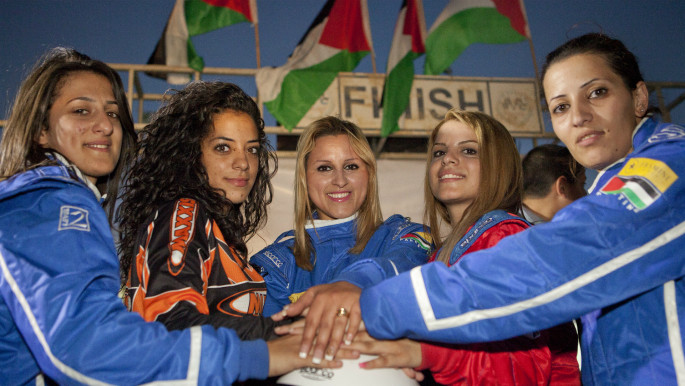 |
|
| Meet the Speed Sisters [left to right] Marah Zahalka, Noor Dauod, Maysoon Jayyusi,Betty Saadeh and Mona Ali [Dogwoof] |
Since its formation in 2009, Speed Sisters has caught people's imaginations both locally and worldwide.
The phenomenon came to the attention of Lebanese-Canadian film director Amber Fares, who produced a feature-length documentary under the team's name.
With its debut in international film circuits scheduled for the end of March 2016, the director of Speed Sisters as well as the team-leader spoke to The New Arab to tell their story, driven above all else by the desire to see dreams realised.
"The central idea behind the film is to show how places defined by occupation and conflict still have dreams," Fares tells The New Arab.
"Despite the occupation and the hard life that comes with it, people living here have aspirations that they work towards achieving," Fares says, "I wanted to highlight that Palestinians have dreams like everyone else."
 |
Despite the occupation and the hard life that comes with it, people living here have aspirations that they work towards achieving |  |
Crushing stereotypes
The tumultuous world of Ramallah, de-facto capital of the Palestinian administration but ever-creaking under the incessant pressures of Israeli government power, serves as home to director Amber Fares. It was there that the idea of making a film about Palestinian women racers was born.
But Fares' motivation in bringing this film to movie theatres worldwide goes far beyond simply breaking the misconception of the "oppressed" Arab woman.
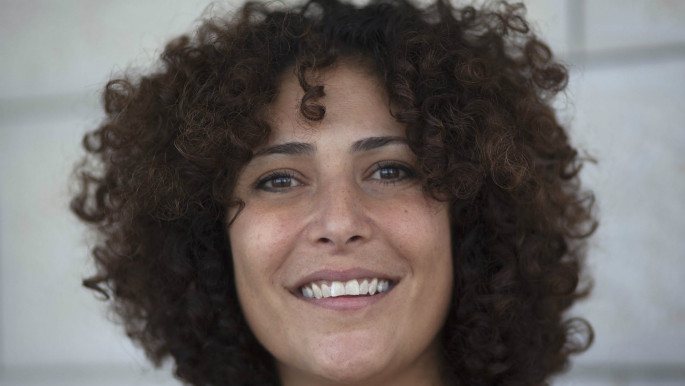 |
| Lebanese-Canadian film director Amber Fares is behind Speed Sisters [Dogwoof] |
"Much broader issues are brought out in the film than just breaking the cliché of Arab women," Fares tells The New Arab.
"The problem is Arabs and Muslims are often portrayed in one narrative, which is prominent in Western media as I saw when growing up in Canada," she says.
"There is such a disconnection with reality. The difference was huge between my experience in coming from an Arab background and what I saw on TV."
"Through this production, I wanted to [also] break the stereotype of the Arab man," Fares says. "I mean it is true that women are not allowed to even drive in Saudi Arabia, but I wanted to show that the Palestinian society, very much like the Lebanese and Jordanian for example, is much more liberal when it comes to these matters," including both men and women.
But what makes the story of Speed Sisters more compelling is that it is in the context of Palestine that an all-women team rally racing is formed.
 |
What makes the story of Speed Sisters more compelling is that it is in Palestine that an all-women team rally racing is formed |  |
By itself it would be quite rare anywhere in the world, but that it happens in an Arab country of the Middle East highlights the flimsy nature of stereotypes.
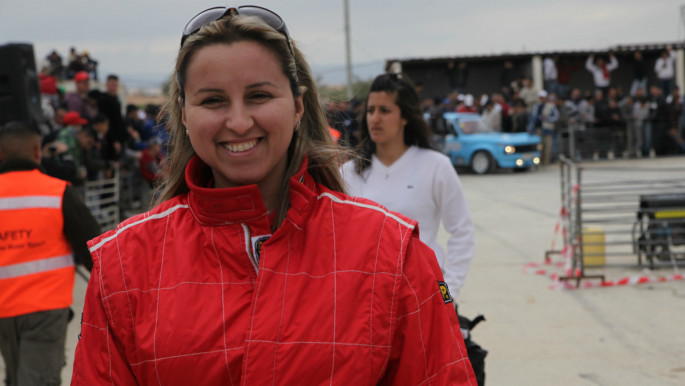 |
| Team captain Maysoon Jayyusi poses at a rally competition in the West Bank [Dogwoof] |
"Car racing is a male dominated sport," Fares tells us. "That is the case all over the world, and women have to face a similar struggle everywhere to prove themselves."
The most striking narratives to emerge from the story is that of Palestinian rallying to support the Speed Sisters, neither overwhelmingly objecting nor reluctantly accepting their entry into the sport, but actively helping.
"Speed Sisters were able to prove themselves and the men in their society accepted them."
"The head of the federation saw the drive in the girls and created the space for them, while fellow male racers supported them," Fares says, "This is the story I wanted to share with the world."
 |
Speed Sisters were able to prove themselves and the men in their society accepted them |  |
Maysoon Jayyusi, now based in Jordan, emerges from the documentary as one of the driving forces behind the team.
Both rally-driver and team-leader, Jayyusi shows a deft hand in dealing with team rivalries, bureaucracy and the overbearing presence of the Israeli occupation.
 |
| The father and brother of Speed Sisters team member Marah Zahalka watch her race [Amber Fares] |
She is often found sitting serenely behind the till of a small fashion store she owns, an oasis retreat in the beleaguered world of the West Bank.
Jayyusi's account tells both of the multiple obstacles faced as a female and as Palestinian in putting pedal to the metal, but also of the breadth of support and care from society around her.
"My family only found out that I was a rally driver from the newspapers, after the team received some publicity," Jayyusi tells The New Arab.
But the reason why she choose not share the news with her parents at first had little to do with stereotyped gender roles.
"My parents are like all parents in the world. When their daughter tells them she wants to participate in a dangerous sports like racing, they will object because it is very risky," Jayyusi says.
"So I did not tell my parents for that reason. I did not want them to worry about me. I myself was still very new to the idea, and because they also did not know, it made me very cautious."
 |
When my father found out, he was very proud and very happy - Speed Sisters' Team captain |
 |
Supportive men
"But when my father found out, he was very proud and very happy," she added.
The support of Jayyusi's father reflects one of the major themes told in Fares' Speed Sisters of a society often stereotyped as backward and overwhelmingly patriarchal.
Across the team, the girls tell of the support from their parents, families and friends, despite occasional grumblings.
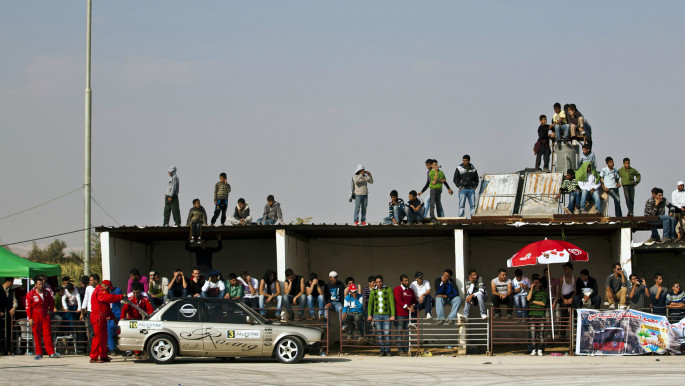 |
| People gather to watch the race in Jericho, West Bank [Tanya Habjouqa] |
Most notably, the head of the Palestinian Racing Federation, Khaled Qaddoura, extends a particularly open hand.
"The Palestinian Racing Federation takes fees from all participants of the races, except from female participants," Jayyusi tells us.
"Qaddoura does not charge female participants to encourage more of them to join."
"Palestinian society always supports women; unlike some other Arab societies, it is very different here," Jayyusi says.
"Look at Hanan Hroub, the Palestinian woman who won the best teacher global award. Her husband supported her, her family supported her, her community supported her and the minister of education supported her."
"After she won, her picture was plastered up across all the walls in the city. We are all very proud of her," Jayyusi adds.
"So when it comes to the rally driving, this is an issue that naturally some men, like some women, may oppose or support, but it is not an issue related to gender," Jayyusi insists; "At least not in Palestine."
Stalling under occupation
The furious motion of rally-driving in Palestine is ever contrasted with the sombre stillness of the Israeli separation wall skirting around the West Bank.
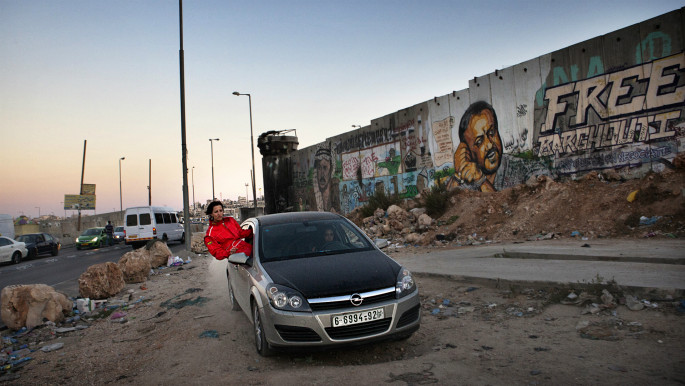 |
| The Israeli separation wall skirting around the West Bank forms a stark backdrop [Tanya Habjouqa] |
Bleak metal cages that lead into heavily-manned check-points puncturing the wall, together holding thousands of people who wish to travel beyond the wall for hours each day, have become part of everyday life in the West-Bank.
For the Speed Sisters, the Israeli occupation and the security regime form a stark backdrop of occupation contrasting with the freedom of being behind the wheel.
For team leader Jayyusi, it was the hours of mindless queuing under the sights of soldiers bearing loaded guns that led her directly to rally driving.
"When you have just been allowed to pass through an Israeli checkpoint after hours of waiting inside your car, all you feel like doing is putting your foot down and driving as fast as you can" she says when asked about what led to her to rally.
 |
When you have just been allowed to pass through an Israeli checkpoint after hours of waiting inside your car, all you feel like doing is putting your foot down and driving as fast as you can |  |
Through Amber Fares' directorial eye, the separation wall is an ever-present backdrop to the obstacles faced by the girls in the rally-racing team.
"You have the cars and the freedom they feel in the cars, of mobility, of being able to go where they want to go," she says. "Against the...wall that stopped them, it is part of their lives, the freedom they get from driving against the limitations of living under occupation."
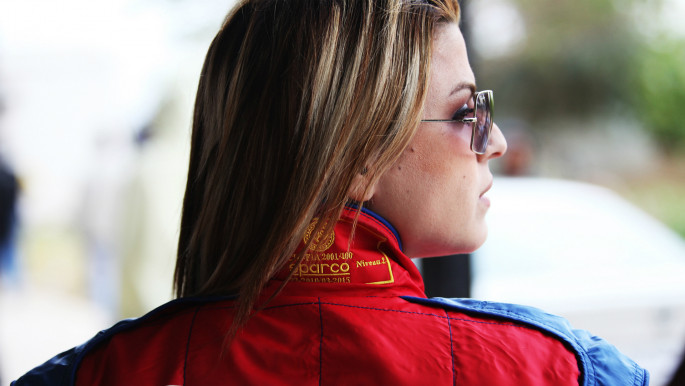 |
| Speed Sisters team member Betty Saadeh is a local celebrity [Amber Fares] |
If racing in a male-dominated sport becomes one obstacle the women racers need surmount, life under occupation forms a yet greater and far more dangerous one.
Racing in Palestine is defined by limits the occupation sets, from the kinds of imports they are allowed, to the lack of wide-open spaces for training, and the sheer hurdles they face in trying to freely travel to different races in the annual calendar.
In the Speed Sisters documentary, the occupation is never far from the camera, most hauntingly when the girls are caught at a sudden flareup of violence between Israeli soldiers and stone-throwing youth.
When Betty Saadeh, the local celebrity among the women's drivers, is hit by a tear-gas canister during the melee, the regular dangers faced become most apparent.
"When my father watched the screening of the film, he walked out in tears," team-leader Maysoon Jayyusi adds.
"He had no idea of the obstacles we faced when trying to train. For example, I did not tell him that a team member was shot during training."
 |
When Betty Saadeh, the local celebrity among the women's drivers, is hit by a tear-gas canister during the melee, the regular dangers faced become most apparent |  |
But for Jayyusi, the collective feeling shared by Palestinians in the West Bank living under occupation fuelled much of the support the Speed Sisters received from their communities.
"The occupation is part of it," she says about the very fabric of the team.
"So much of their lives is [already] being dictated through the pressure of living under occupation that when someone finds a hobby and a passion, people in general will support that," Jayyusi says.
"Speed Sisters are doing great. The team is professional. So naturally we will get our community's support against all odds."
Dreaming to the Silver Screen
A number of films and documentaries have looked at the struggle of women breaking through male-dominated sports, including those focused on Middle-Eastern narratives like Iran's "Girl-Racer" and Laleh Seddigh and Ariel Nasr's "Boxing Girls of Kabul."
But for team leader Jayyusi what makes the story Speed Sisters distinct is the idea of fulfilled dreams, despite overwhelming obstacles.
"We are the only girls team in the Arab world, and we want to be an example for all the girls in the Arab world, to show them that you can realise your dreams," Jayyusi says.
"Women in all societies across the world are fighting some kind of battle themselves, but for us we wanted to show everyone that despite the political situation we made it! We overcame all obstacles," she concludes.





 Follow the Middle East's top stories in English at The New Arab on Google News
Follow the Middle East's top stories in English at The New Arab on Google News


